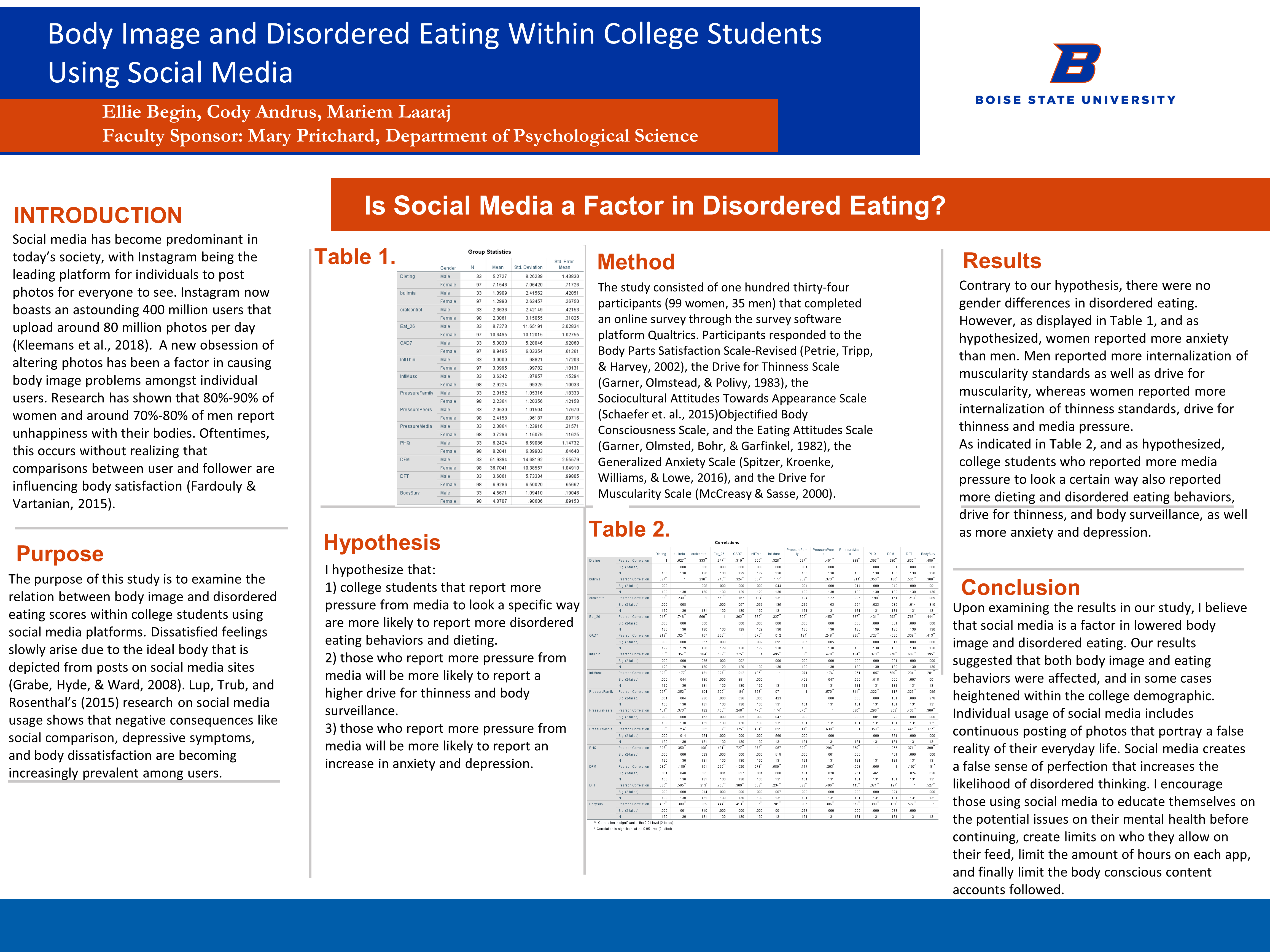Ellie Begin, Cody Andrus, Mariem Laaraj, Dr. Mary Pritchard

Introduction
Social media has become predominant in today’s society, with Instagram being the leading platform for individuals to post photos for everyone to see. Instagram now boasts an astounding 400 million users that upload around 80 million photos per day (Kleemanset al., 2018). A new obsession of altering photos has been a factor in causing body image problems amongst individual users. Research has shown that 80%-90% of women and around 70%-80% of men report unhappiness with their bodies. Oftentimes, this occurs without realizing that comparisons between user and follower are influencing body satisfaction (Fardouly& Vartanian, 2015).
Purpose
The purpose of this study is to examine the relation between body image and disordered eating scores within college students using social media platforms. Dissatisfied feelings slowly arise due to the ideal body that is depicted from posts on social media sites (Grabe, Hyde, & Ward, 2008). Lup,Trub, and Rosenthal’s (2015) research on social media usage shows that negative consequences like social comparison, depressive symptoms, and body dissatisfaction are becoming increasingly prevalent among users.
Hypothesis
I hypothesize that:
1) college students that report more pressure from media to look a specific way are more likely to report more disordered eating behaviors and dieting.
2) those who report more pressure from media will be more likely to report a higher drive for thinness and body surveillance.
3) those who report more pressure from media will be more likely to report an increase in anxiety and depression.
Method
The study consisted of one hundred thirty-four participants (99 women, 35 men) that completed an online survey through the survey software platform Qualtrics. Participants responded to the Body Parts Satisfaction Scale-Revised (Petrie, Tripp, & Harvey, 2002), the Drive for Thinness Scale (Garner, Olmstead, & Polivy, 1983), the Sociocultural Attitudes Towards Appearance Scale (Schaefer et. al., 2015)Objectified Body Consciousness Scale, and the Eating Attitudes Scale (Garner, Olmsted, Bohr, & Garfinkel, 1982), the Generalized Anxiety Scale (Spitzer, Kroenke, Williams, & Lowe, 2016), and the Drive for Muscularity Scale (McCreasy& Sasse, 2000).
Table 1.
Contact Students for Content
Table 2.
Contact Students for Content
Results
Contrary to our hypothesis, there were no gender differences in disordered eating. However, as displayed in Table 1, and as hypothesized, women reported more anxiety than men. Men reported more internalization of muscularity standards as well as drive for muscularity, whereas women reported more internalization of thinness standards, drive for thinness and media pressure.
As indicated in Table 2, and as hypothesized, college students who reported more media pressure to look a certain way also reported more dieting and disordered eating behaviors, drive for thinness, and body surveillance, as well as more anxiety and depression.
Conclusion
Upon examining the results in our study, I believe that social media is a factor in lowered body image and disordered eating. Our results suggested that both body image and eating behaviors were affected, and in some cases heightened within the college demographic. Individual usage of social media includes continuous posting of photos that portray a false reality of their everyday life. Social media creates a false sense of perfection that increases the likelihood of disordered thinking. I encourage those using social media to educate themselves on the potential issues on their mental health before continuing, create limits on who they allow on their feed, limit the amount of hours on each app, and finally limit the body conscious content accounts followed.
Additional Information
For questions or comments about this research, contact Ellie Begin at elliebegin@u.boisestate.edu.